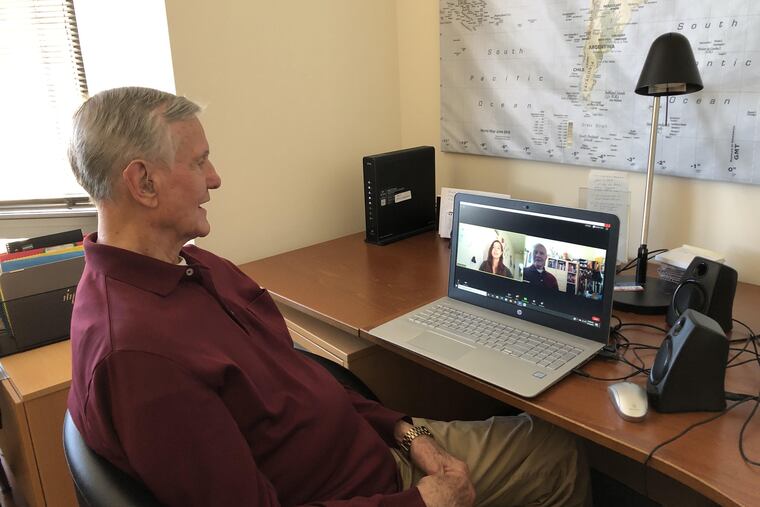College students give virtual respite to dementia caregivers
It's another way to address social isolation among the elderly and to foster relationships between the old and young.

On a chilly Saturday morning in September, Judith Weeks set up the Zoom call that would give her a short-but-liberating break from caring for her 90-year-old husband, Chris, who has worsening dementia.
As he does each week, Chris Weeks would talk for about an hour with Ximena (pronounced hee-men-uh) Trejo-Mora, a 20-year-old premed student at Temple University, as part of a new virtual program called Weekly Smile that pairs student volunteers with older adults who need care-giving, often for dementia.
Trejo-Mora was chosen to work with Weeks because the former State Department employee loves languages and travel, and they both speak Spanish. Her parents, who live in Lansdale, moved to the United States from Mexico when she was 3.
After asking how Trejo-Mora’s organic chemistry class was going — “stressful” — Judith Weeks left the two to talk.
“¿Cómo estás?” Trejo-Mora asked Chris Weeks.
“Muy bien. Gracias,” he responded.
From there, the Spanish deteriorated. She spoke a sentence. He looked puzzled. She translated, and he mostly answered in English with exceptions like absolutamente and delisioso. He apologized, gently and politely, with nearly the same words over and over: “I’m having a little trouble understanding what you’re saying. That’s probably my problem, not yours.” She responded with the slightest of smiles and patiently persisted with questions in Spanish, then English, that let him talk about his travels in Spain and the Middle East and food he has loved everywhere.
No matter. He was happily engaged in a conversation with a young, eager listener. His caregiver was getting a break, and she was happy that her husband was doing something that “he loves that challenges his memory.”
They both look forward to the visits, she said.
The program is a joint effort from the Penn Memory Center and Temple University’s Intergenerational Center in the College of Education and Human Development. It started as Time Out about two years ago as a respite program funded by the Pew Charitable Trusts. Students were paid $8.50 an hour — well below the going rate for professional caregivers — to meet with elders for three to four hours at a time in person. That gave spouses and other family caregivers a chance to leave the house and run errands. And it gave students a chance to form intergenerational relationships and test what it would be like to work with older adults for a living.
Then the pandemic forced the program coordinators, J.T. Kendall from Temple and Megan Kalafsky from Penn, to get creative. The elderly are at high risk for serious complications from COVID-19 and death, so in-person visits were out. Instead, they began offering the shorter virtual visits this summer. On the plus side, that means student transportation is no longer an issue, so caregivers can live in a wider geographic area. Weekly Smile has volunteers from several area institutions, including Penn, Temple, Drexel University, and Haverford College. Caregivers or older adults interested in Weekly Smile can sign up at timeoutcare.org.
Trejo-Mora loved the idea of helping caregivers. She enjoys the challenge of helping Weeks remember the language he learned while working in Spain decades ago. His pronunciation is “phenomenal,” she said. She has not traveled widely and likes hearing about his adventures. “It’s very fun hearing about his life,” she said.
She enjoys his “positive energy” and his drive to keep learning. “I feel very fulfilled after our conversations,” she said. She also appreciates stepping away from her studies: “It’s nice to just have an hour and stay in the present and have a conversation with someone.”
Gabrielle “Gigi” Benzio, a 20-year-old art therapy major at Temple, signed up for the in-person version of the program because she had loved a program at her high school in Doylestown that paired students and people with dementia for art projects. Her first matches fell through, so she is now chatting on Zoom weekly with Ellen Staller, a 70-year-old Philadelphia woman with multiple health problems. Staller had no interest in doing art together, but enjoys talking. Benzio suggested a kind of show-and-tell where Staller discusses her favorite belongings. She also likes offering advice to the younger woman. Mostly, Benzio said, Staller tells her to cherish the people in her life and enjoy her youth. Staller likes to hear what Benzio is up to. “Her life doesn’t change too much,” Benzio said.
Judith Weeks said she and her husband are usually active and do a lot of traveling. It’s been hard for her to keep him interested while they’ve been holed up at home in Center City. She likes seeing how much he enjoys talking with Trejo-Mora. “Ximena is wonderful,” she said. “She’s very patient and she’s very personable and she’s very cheerful.”
Asked whether the Zoom chats are a high point, Chris Weeks said, “Absolutely. I’m looking forward to it with enthusiasm.”
Heather Staller, 47, moved in with her mother after the pandemic started. Her mother didn’t want aides coming into the house in Philadelphia.
Ellen Staller doesn’t always want to Zoom, but almost always brightens once she does. “Once she starts talking, she comes out of her shell,” Heather Staller said. “She seems more cheerful. Her spirits seem lifted.”
Meanwhile, the daughter has enough time for a walk, a bubble bath, or a cup of coffee on the balcony. “It’s kind of like a sigh of relief,” she said. “As short as it is, it also makes me smile.”
The calls make life more interesting for the Stallers. “It gives us something to talk about,” Heather Staller said. “When you’re stuck with someone 24/7, how much can you talk about?”